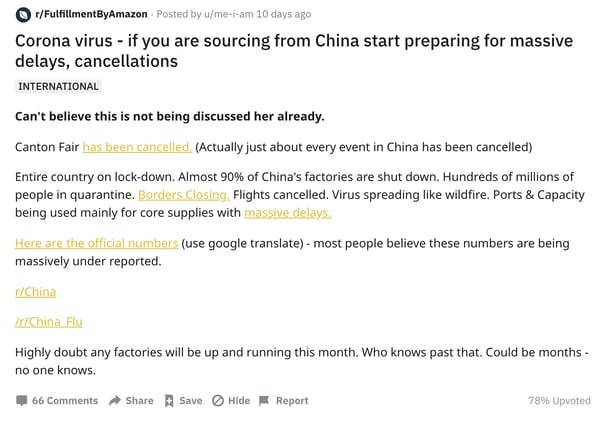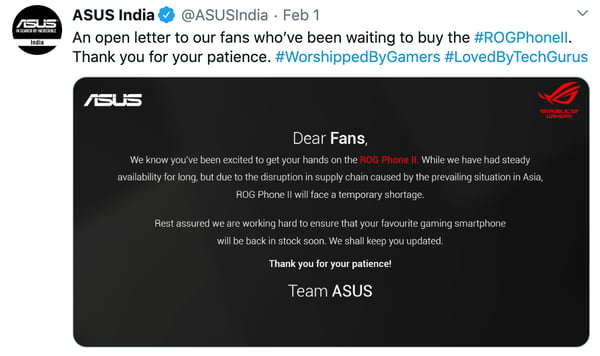Brands need to have a clear strategy to avoid supply chain headaches in light of the Chinese factory shutdowns.
There’s been a lot of discussion about the Coronavirus since the start of the year, and now we’re starting to see the health crisis impact the global economy in a variety of ways.
Brands need to understand how the Coronavirus has and will continue to impact the Amazon marketplace.
In this article, we’ve outlined the immediate factors, and best practices for Amazon vendors and sellers moving forward.

How Is The Coronavirus Impacting Factories And
Manufacturing In China?
According to Fortune, a large portion of China’s industrial complex has now (February 20th 2020) started to return to work after an enforced several week shutdown.
But this doesn’t necessarily translate to “business as usual”. NBC reports that because of the ongoing travel bans and border closures many manufacturers are unable to acquire raw materials for production, and not all workers are yet back on the job.
 “One of my clients, a brand selling in the Home, Furniture & Office category, was supposed to launch new products, but due to the Coronavirus they have no idea when the new inventory will arrive at the Amazon fulfillment centers.”
“One of my clients, a brand selling in the Home, Furniture & Office category, was supposed to launch new products, but due to the Coronavirus they have no idea when the new inventory will arrive at the Amazon fulfillment centers.”
- Katarina Kosovac, Bobsled
Client Account Specialist
The next few weeks will be telling. An expert Chinese pulmonologist believes that the numbers of infections will soon plateau, and this could pave the way for a manufacturing recovery. But if the infection and death toll rises, many commentators predict that the Chinese authorities will understandably be forced to implement another shutdown, and this would once again grind manufacturing to a shuddering halt.
How Is The Coronavirus Impacting Trade Shows?
Trade shows have been disrupted by the travel bans and warnings issued by governments the world over. According to the BBC the most high-profile cancellation so far has been the Mobile World Congress which was scheduled to take place in Barcelona at the end of February. The Canton Fair, the oldest trade fair in China which has historically been a popular event with Amazon sellers, has also been cancelled.
Bobsled Sales Manager Brittany Startzel says, “I recently spoke with a potential Bobsled client that was at a trade show in Frankfurt. He said the turn out was terrible because no one was willing to travel internationally. And he shared that a lot of vendors are panicking because the Chinese government has been issuing mandatory shutdowns on some factories, so there is an inventory concern.”
Trade shows are important innovation and networking hubs for brands selling on Amazon. Show cancellations and poor attendance numbers will likely stifle strategic expansion for many brands, specifically in relation to new product development.
“A lot of vendors are panicking because the Chinese government has been issuing mandatory shutdowns on some factories, so there is an inventory concern.”
- Brittany Startzel, Bobsled Sales Manager
How Is The Coronavirus Impacting Supply Chains?
The most high profile Coronavirus supply chain victim has been Apple. According to Cowen analysts, one of the primary iPhone manufacturing facilities in China is only operating at a 25% factory utilization rate as many workers remain absent, and Reuters reported that a 2% drop in Apple’s stock is set to wipe nearly $30 billion off its market capitalization.
The Coronavirus has made one thing crystal clear; the global reliance on Chinese just-in-time manufacturing. If Apple is getting burnt, you can bet your bottom-dollar small and medium-sized brands are too.

Above: Reddit has been alight with Amazon Seller Coronavirus discourse. Image source.
Will The Coronavirus Cause Inventory Problems On Amazon?
The trickle down effect of serious supply chain issues is that many brands will have to make hard decisions about how to allocate dwindling inventory between brick-and-mortar, online marketplaces and their own ecommerce channels.
Ross Walker, Bobsled PPC Manager says, “Two of my clients are currently rejigging their offerings to work with the stock they have. I have a few clients who don’t manufacture there (China) at all, but if I take a look at the ratio of clients who do, and multiply that with the sample size, I can see the writing on the wall.”
Even short-term stock outs can undo years of hard work in respect to your Amazon presence as competitors with inventory will gain valuable market share and see an improved Best Seller Rank (BSR). In a past Bobsled blog post, we outlined how stock outs will hurt your Amazon PPC campaigns.
Also, brands with Coronavirus supply chain issues may need to re-think their new product launch plans for 2020. Adequate inventory reserves are a staple of successful new product launch programs.

“I have a few clients who don’t manufacture there (China) at all,
but if I take a look at the ratio of clients who do, and multiply that
with the sample size, I can see the writing on the wall.”
- Ross Walker, Bobsled PPC Manager
Is The Coronavirus Making Sellers Adopt Black Hat Tactics
And/Or Price Gouging?
There have been some reports of black hat tactics being implemented by certain bad actors. The following excerpt comes from a post on the Amazon Services Seller Forum:
“I have some dear friends in Honk (sic) Kong and have learned there is a shortage of face masks… So I am about to buy 500 or so of those masks wanting to send it to them. Your normal retail for a surgical face mask pack of 50 is about 10 bucks, perhaps 20 with shipping. Just search Amazon for surgical face mask. The real sellers are all sold out and what is left is prices that will quote $19.00 for pack of 50 masks With $150.00 shipping charge… Thousands of listings by the same seller on every imaginable brand with quite an interesting less than 50% feedback. I am expecting prices to go up, what surprises me is that Amazon is letting one seller scam so many customers - I am sure Amazon’s algorithm is smart enough to catch this type of a scam.”
Due to the nature of the Amazon marketplace it’s unclear whether the face mask resellers outlined above are legitimate sellers with authentic products that are engaging in price gouging, or whether they are counterfeiters looking to deceive desperate customers. Either way, Amazon is reportedly punishing bad actors with account suspensions.
In light of the crisis certain medical products have become an extremely hot commodity the world over. Economic Times reported that a new face mask factory will be built in Beijing in just 6 days, and that this factory will be able to churn out 250,000 face masks each day. As these highly sought-after products become available, it’s likely some parties will inevitably try to profit through price gouging on the Amazon platform.
What Should Amazon Sellers Be Doing In Light
Of The Coronavirus Crisis?
Here are some things brands should be considering at this point in time:
1. Follow Amazon’s Coronavirus Account Management Guidelines
Amazon issued a Coronavirus notification for sellers, outlining recommended best practices in respect to maintaining account health. Read it here. The notification also explains that Amazon will view any performance notifications as unforeseen events if an adequate description is delivered by sellers.
We’d encourage all Amazon sellers to read and follow these simple guidelines. Affected Vendors should either speak with their Amazon rep or create a case through Vendor support.
2. Get Clear On Channel Priorities
Each brand should assess which channels need to be prioritised when it comes to remaining inventory for products with supply chain issues. Having a clear understanding of how the Amazon channel functions is a crucial element in this decision making process.

“It’s important to understand that being out of stock on Amazon costs more than the missed sale,” says Bobsled Project Manager Jordan Ripley.
"Continued product unavailability has long-term impact that outlasts merely the time that the listing is inactive. Understand this tradeoff - allocating inventory to other smaller non-Amazon channels may save you profitability in the short term, but it also could dig you into a hole when you try to regain your BSR is readily available again."
- Jordan Ripley, Bobsled Project Manager
3. Direct, Honest Communication With Customers
When it comes to setting expectations with customers, honesty is always the best policy. If you’re a brand that’s anticipating a supply chain crunch, make an announcement as early as possible.
Here’s an example announcement from ASUS India regarding the temporary shortage of their ROG Phone II:

Above: Screenshot from Twitter
4. Promote In-Stock Products
Now is this time to push/cross-sell other products in your line that aren't impacted by manufacturing shortages. Re-allocating PPC spend accordingly is also a no-brainer.
5. Consider Different Sourcing & Manufacturing Options, Inventory Planning Strategies
If you’re a brand that’s been wanting to diversify out of China for a while, the Coronavirus may be just the thing that makes you pull the trigger.
This of course is easier said than done for a lot of brands, especially on short notice. Many sourcing and manufacturing alternatives have traditionally been unviable for certain products due to slim profit margins. The Coronavirus crisis could be the catalyst for a lot of brands re-thinking which products they want to manufacture in the future, and how much “rainy day” inventory should be available at any given moment.
6. Understand That The Coronavirus May Impact Consumer Behavior
The cancellation of several trade shows illustrates how the Coronavirus has already changed consumer behavior. Certain product categories, for example Travel Accessories, are going to be more directly impacted by the Coronavirus than others.
Therefore, if you’re an unlucky seller in one of the affected categories you may need to adjust your expectations to align with the change in consumer behavior. Simply postponing a new product launch for a couple of months may save you some serious headaches in the short-term.
7. Report Amazon Terms Of Service Breaches
Amazon is slowly improving when it comes to identifying and punishing bad actors selling on their platform, but due to the sheer volume of sellers there are often many who slip through the cracks.
If you encounter a seller engaging in terms of service violations to capitalize on the Coronavirus outbreak Amazon encourages you to report it. Instructions on how to do so can be found here.
Unknown Unknowns
At this point in time there is a myriad of unknowns when it comes to assessing exactly how the Coronavirus will impact Amazon. Yet, considering the global ramifications that the crisis has already caused, if you’re a brand selling on Amazon it would be prudent to start developing some contingency plans as soon as possible.
If you’d like a Bobsled Specialist to review your Amazon presence please set up a consultation by clicking the button below.
Tagged: Amazon Account Management, Operations, Amazon Updates
.png)


